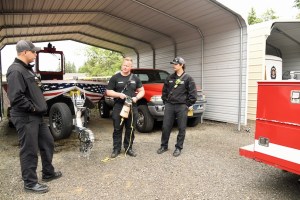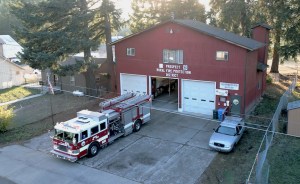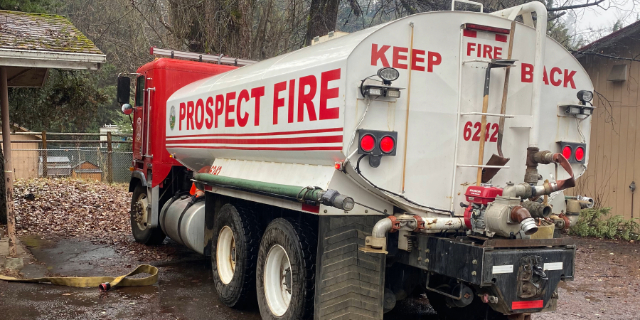Getting by on ‘the bare minimum’: Rural voters to decide on fire district funding
Published 12:47 pm Monday, April 28, 2025




Pair of neighboring rural fire districts both say levies in May 20 special election would prevent service reductions and other critical cuts
Voters in two neighboring communities on the north end of Jackson County will be asked to decide on a pair of fire district tax levies in the May 20 special election that officials say will help prevent damaging cuts.
Officials for Jackson County Fire District 4 and the Prospect Rural Fire Protection District say voter approval for added funding would stave off service level reductions amid rising inflation, and mitigate property insurance increases.

Jackson County Fire District 4 firefighters talk about the upcoming special election. The district would lose four of seven paid staff if a levy is not approved by voters. Buffy Pollock / Rogue Valley Times
Shady Cove-Trail fire protection
For Jackson County Fire District No. 4, which serves about 4,700 patrons in a 37.5-square-mile area between Shady Cove and Trail, a five-year local operating levy — $1.10 per $1,000 of assessed value beginning in 2026 — would stave off a 50% staffing cut.
District officials say they’re not trying to add anything new, just keep up with inflation despite hosting operations out of an antiquated 1980s-era station with limited space for vehicles or personnel.
Currently funding seven paid emergency responders and relying on volunteers and student firefighters to fill in the gaps, the district said levy failure would cost the district four paid positions.
While a 2015 SAFER grant enabled an initial staffing increase, staffing levels have been maintained by a voter-approved 99-cent levy since grant funds ran out. With the current levy expiring in June 2026, district officials are asking for renewal with a 10-cent increase.
Mike Krutsch, a District 4 board member who spoke as a district patron, said the district operates on a shoestring budget, purchases new equipment based on station size rather than district need and is “already dealing with a station that’s over 40 years old.”
“We’re busting at the seams, and we have our expensive equipment that we have to store outside because we don’t have the facilities. We’re just trying to maintain … not get anything more,” Krutsch said.
“We’re asking for an extra dime, which is really just a cup of coffee. I know people will say, ‘Why can’t you live within your means?’ We have no control over the massive inflation. We’re trying to economize, but you can only do so much.”
Fire Chief Travis Crume said even a reduced staffing model would eventually become difficult to maintain.
“In a couple years, our tax levy won’t be enough to support even those four positions,” he said.
“It’s hard because we spend so much time and resources training these folks. I have firefighters here that are close to 10 years invested.
“Time and energy and training has gone into these people and to have them leave and go elsewhere would be devastating,” Crume said.
The second of a pair of town hall sessions is set for 6:30 p.m. May 6 at the Edgewater Inn conference room, 7800 Rogue River Drive, Shady Cove.
For levy information for District 4 patrons, visit jcfd4.com/measure-15-236.

The Prospect Rural Fire District operates with an all-volunteer crew and a small, $120,000 annual budget. Courtesy photo
Prospect all-volunteer department could cut medical responses
Up the road from the Shady Cove station, supporters of a proposed levy for the Prospect Rural Fire Protection District say ongoing survival of the small, volunteer-run department hinges on what would be the district’s first funding increase since the 1950s.
A current 99-cent operating levy implemented seven decades ago funds the “absolute bare minimum,” Fire Chief Lyle Neville said. The department operates with a 16-member volunteer crew and an aging, mostly donated vehicle fleet.
The proposed five-year assessment — $1.39 per $1,000 of assessed value beginning in 2026 — would stabilize the district, make needed improvements and cover increasing costs for training, insurance, equipment repair and maintenance, levy supporters say.
With an annual budget of $120,000 from tax revenues, Neville said the department survives on the good intentions of unpaid labor and surrounding districts who share their discarded hand-me-downs.
In 2024, the department had “zero dollars” budgeted for necessary PPE (personal protective equipment), Neville said, “but the reason we budgeted ‘zero’ was just on the hope and prayer we could find a grant for it,” he told the Rogue Valley Times earlier this year.
If the levy fails, residents face increased property insurance rates, or could become uninsurable, and the district could be forced to eliminate medical response entirely, which Neville said is “especially concerning” with ambulance transport service response between 45 and 90 minutes.
“The district’s original tax rate was merely for fire protection and did not allow for emergency medical responders. We literally spend fire engine tire money to buy medical supplies, equipment and for training,” Neville said.
Prospect volunteer firefighter and medical responder Mike Gatewood said he doubted Prospect residents realize the dire straits the department is in.
“Most of what we do is either with grant money — and with the current administration that might be slowing down quickly — or we find a way to do things for free,” Gatewood said.
“About 80% of the emergency calls we get are medical, and we get zero funding for medical equipment or medical anything, so we’re taking money from the fire department to pay for the medical stuff.”
Gatewood said loss of volunteers or increased regulations could make or break the department.
“Our chief gets paid for nine hours a week, yet for well over a year he’s worked more than 40 hours a week,” he said.
“Something else nobody is talking about is there are new OSHA rules where, even in volunteer departments, if we fail to meet certain standards because of our equipment or whatever, they could take away our license to do this at all. … We’ve just been robbing Peter to pay Paul for so long, something has to give.”
For more info on district meetings or events, visit prospectrfpd.org. For information on the levy, visit the Jackson County elections website.
Voters’ Pamphlets were mailed last week, and ballots will be sent out Friday, May 2. Voters must be registered by Tuesday, April 29, to be eligible to vote in the May 20 election.
Reach reporter Buffy Pollock at 458-488-2029 or buffy.pollock@rv-times.com. Follow her on Twitter @orwritergal.










